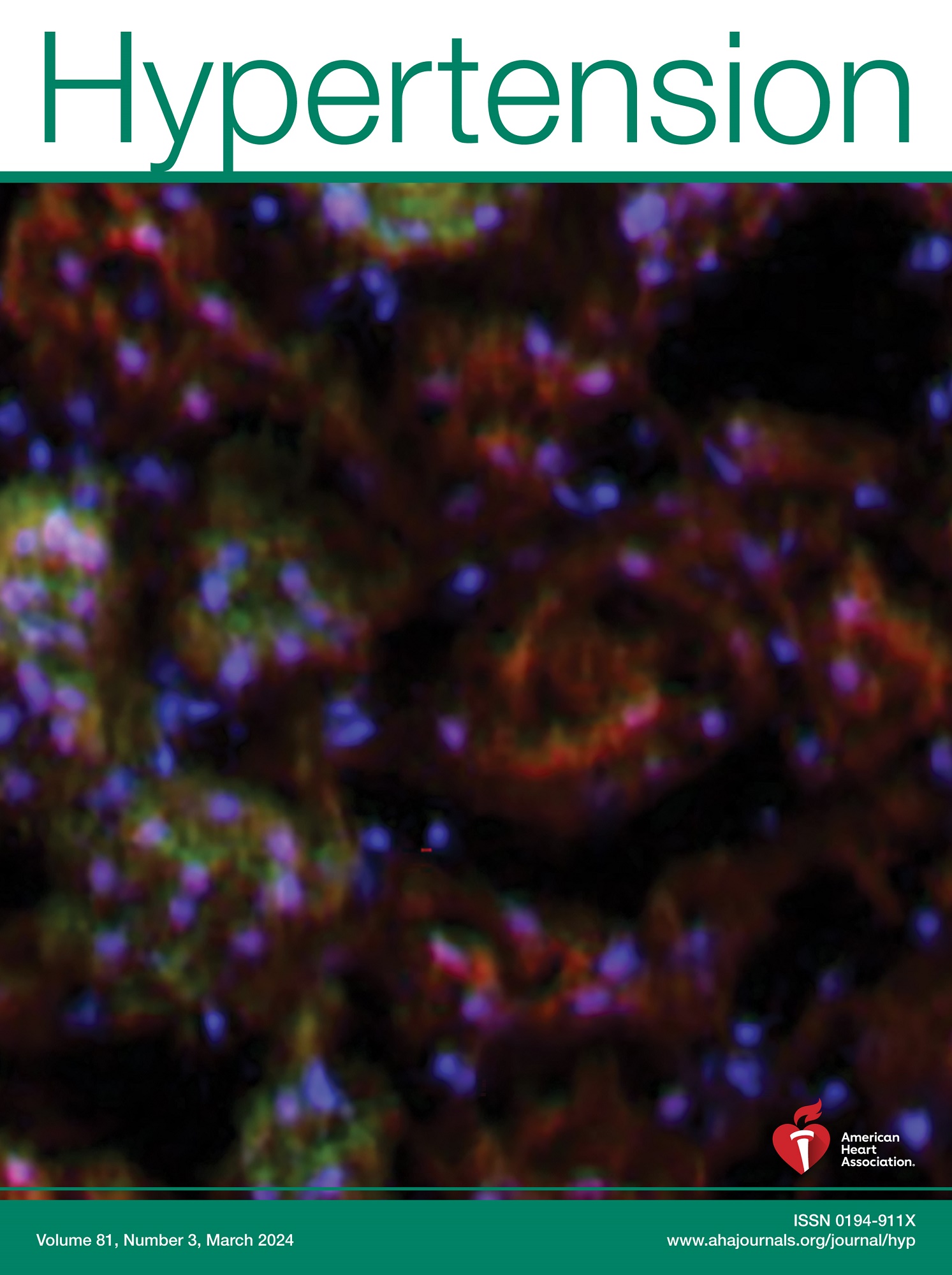一过性高盐摄入促进T细胞介导的高血压血管损伤
IF 6.9
1区 医学
Q1 PERIPHERAL VASCULAR DISEASE
引用次数: 0
摘要
背景膳食高盐(HS)摄入对心血管疾病有很大影响。方法通过饮用水对脂蛋白 E 缺乏的小鼠进行为期 2 周的 HS(1% NaCl)瞬时处理,然后是冲洗期和随后的 Ang II(血管紧张素 II)输注(每分钟 1000 纳克/千克,持续 10 天),以诱发腹主动脉瘤/破裂和炎症。结果与高血压对照组小鼠相比,仅一过性摄入 HS 会引发活化 T 细胞向主动脉的非病理性浸润,但随后输注 Ang II 会增加死亡率以及腹主动脉瘤/剥离和动脉粥样硬化的发生率。两组小鼠的血压没有差异。在一过性 HS 处理的高血压小鼠中,主动脉损伤与炎症加剧、中性粒细胞、单核细胞、CD69+CD4+ T 细胞以及 CD4+ 和 CD8+ 记忆 T 细胞的积累有关。从机制上讲,一过性摄入 HS 会增加 Ang II 处理小鼠主动脉 RORγt 以及脾脏 CD4+TH17 和 CD8+TC1 T 细胞的表达水平。将未处理小鼠的孤立主动脉与 HS 或正常条件下体外极化的 TH17、TH1 或 TC1 细胞的上清液进行孵育,结果显示,HS 分化的 TH17 和 TC1 细胞的分泌因子(而非 TH1 细胞)加速了内皮功能障碍。我们提出了一个双击模型,在该模型中,HS 作为一种易感因素,可增强高血压诱导的 TH17 和 TC1 极化及主动脉疾病。本文章由计算机程序翻译,如有差异,请以英文原文为准。
Transient High Salt Intake Promotes T-Cell-Mediated Hypertensive Vascular Injury.
BACKGROUND
Dietary high salt (HS) intake has a strong impact on cardiovascular diseases. Here, we investigated the link between HS-aggravated immune responses and the development of hypertensive vascular disease.
METHODS
ApolipoproteinE-deficient mice were transiently treated with HS (1% NaCl) via drinking water for 2 weeks, followed by a washout period, and subsequent Ang II (angiotensin II) infusion (1000 ng/kg per min for 10 days) to induce abdominal aortic aneurysms/dissections and inflammation.
RESULTS
While transient HS intake alone triggered nonpathologic infiltration of activated T cells into the aorta, subsequent Ang II infusion increased mortality and the incidence of abdominal aortic aneurysms/dissections and atherosclerosis compared with hypertensive control mice. There were no differences in blood pressure between both groups. In transient HS-treated hypertensive mice, the aortic injury was associated with increased inflammation, accumulation of neutrophils, monocytes, CD69+CD4+ T cells, as well as CD4+ and CD8+ memory T cells. Mechanistically, transient HS intake increased expression levels of aortic RORγt as well as splenic CD4+TH17 and CD8+TC1 T cells in Ang II-treated mice. Isolated aortas of untreated mice were incubated with supernatants of TH17, TH1, or TC1 cells polarized in vitro under HS or normal conditions which revealed that secreted factors of HS-differentiated TH17 and TC1 cells, but not TH1 cells accelerated endothelial dysfunction.
CONCLUSIONS
Our data suggest that transient HS intake induces a subclinical T-cell-mediated aortic immune response, which is enhanced by Ang II. We propose a 2-hit model, in which HS acts as a predisposing factor to enhance hypertension-induced TH17 and TC1 polarization and aortic disease.
求助全文
通过发布文献求助,成功后即可免费获取论文全文。
去求助
来源期刊

Hypertension
医学-外周血管病
CiteScore
15.90
自引率
4.80%
发文量
1006
审稿时长
1 months
期刊介绍:
Hypertension presents top-tier articles on high blood pressure in each monthly release. These articles delve into basic science, clinical treatment, and prevention of hypertension and associated cardiovascular, metabolic, and renal conditions. Renowned for their lasting significance, these papers contribute to advancing our understanding and management of hypertension-related issues.
 求助内容:
求助内容: 应助结果提醒方式:
应助结果提醒方式:


